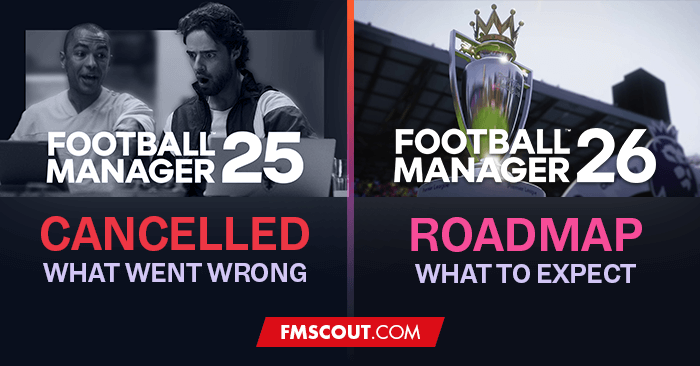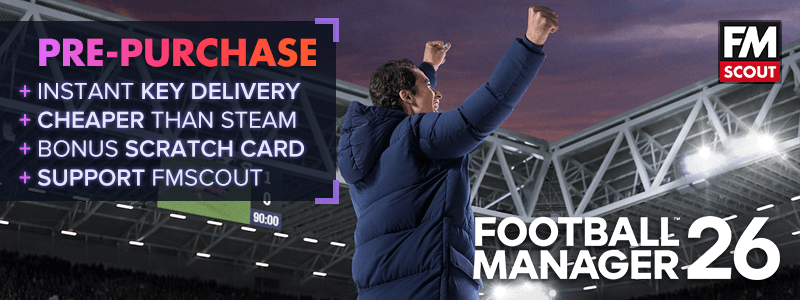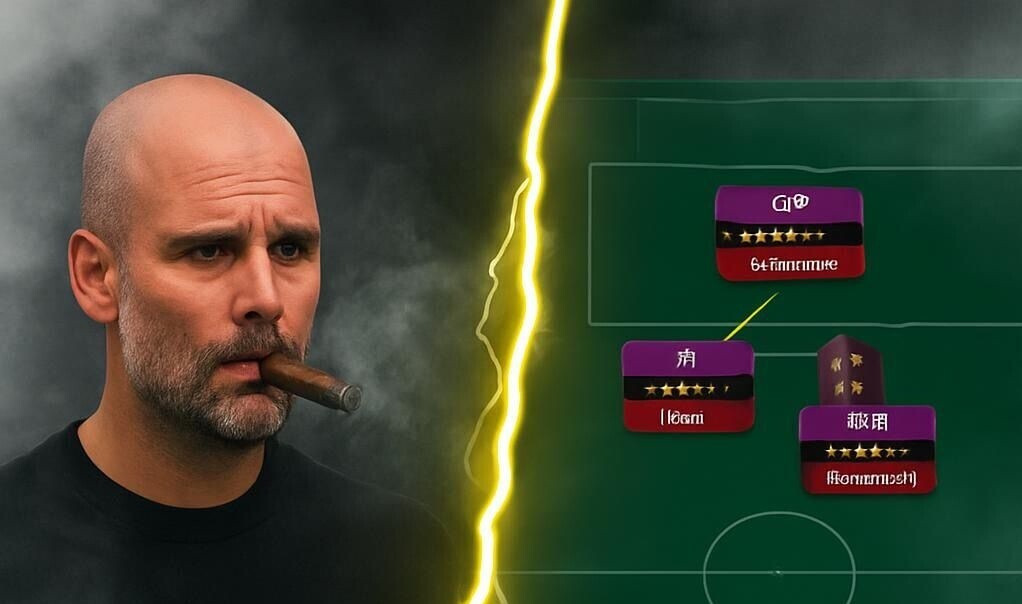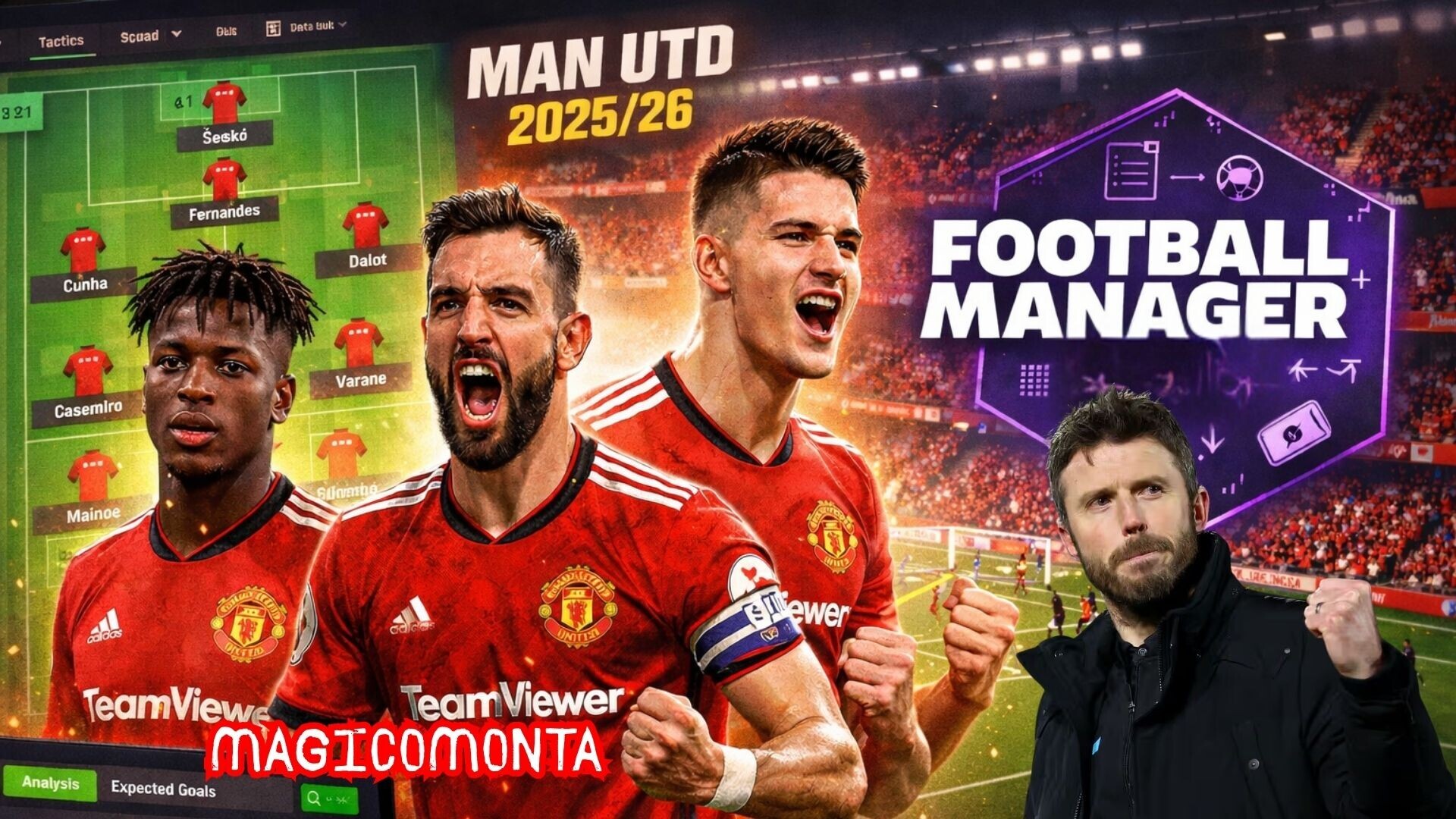
The cancellation of Football Manager 25 was a surprise that left a massive void for millions of players and raised serious questions about the future of the franchise.
 |
Pre-Purchase FM26 from FM ScoutStart playing 2 weeks earlier with advanced access, and enter a special giveaway for 5 chances to win GS26g. |
What exactly went wrong? And more importantly, what does this mean for the highly anticipated Football Manager 26?
The answers have come directly from Sports Interactive's long-time studio director, Miles Jacobson, who has been startlingly open in today's interviews published on Eurogamer and The Athletic, conducting an honest post-mortem on the failed release and a roadmap for the future.
This article puts together all of the key points raised by Miles on his interviews that shed light on what went wrong, what has changed, and what players can actually expect from the new era of the game.
A 30-Year Streak Broken
The cancellation of FM25 in February 2025 ended a 30-year streak of annual releases from Sports Interactive. For a studio with such a reliable track record, the announcement was quite a shock to the FM community.
Development on the game was made known since the summer of 2023, even before the release of FM24. It was meant to be the start of a new era for the series, being built on the Unity engine to provide a significant technical and visual leap forward.
However, what began with a great deal of excitement soon turned into a string of disturbing failures.
The initial release date was pushed to late November 2024, then rescheduled to a March 2025 window before being completely cancelled just a month before its twice-delayed launch.
Miles himself admitted that he "failed to release something that was good enough" and that the entire process was the "roughest of development years" for the studio. He stated:
"I feel the need to apologise to our community for not delivering last year. We’ve become a big part of people’s lives... but pulling the game last year was absolutely the right thing to do".
The Big Picture: A Monumental Challenge
The greatest challenge behind the entire project was the complete migration of the game from its old proprietary engine to the new Unity engine. This was a gargantuan undertaking, described by Miles as "trying to do the impossible".
The old technology had reached a point where it could no longer be extended, and a complete rewrite was deemed necessary in order to introduce new features, improve visuals, and continue the franchise into the next generation.
Everything looked fine on paper. The key systems, including the match simulation and game engine, were functional. The development team had the long-term vision in place.
However, the sheer complexity of moving an entire game of this size was a lot more intimidating than anyone anticipated. As Miles explained it, the process was "trickier than we originally anticipated" and the team was "challenged in a myriad of new ways".
The struggle was in the execution of that vision within the traditional one-year development cycle.
The Post-Mortem: Why the Game Failed
The interviews clarify that the cancellation wasn't due to an absolute failure of the fundamentals of the game. Miles repeatedly stated that the "core game was there" and that it "wasn't crashing a lot".
The problem was mostly about user experience (UX) and user interface (UI). Even though the back-end simulation worked, the new front-end was "clunky," and "just wasn't fun". The new design was a radical departure from the familiar, and it basically broke the player's interaction with the game.
Key information, previously available at a glance, was now hidden behind "multiple clicks," and navigating the new menus was painfully slow. Players were unable to even find basic things like the youth squad screen, evidence of just how badly the new design missed the mark.
Miles recalled realizing "within an hour" of trying a build of the game around Christmas that it couldn't be released, because he "literally sat there and just couldn’t find things in my own game. It was pretty embarrassing".
This is a significant differentiation. The game's engine and database - the "brains" of Football Manager - were mostly functional and intact. Problems were with the user's ability to interact with those brains.
The new UI, in trying to provide a new, sleek look, destroyed the very thing that makes Football Manager so addictive: the famous "one more game" aspect. That feeling of one match flowing into another, of being able to make quick, instinctive decisions, was gone.
Instead, it was replaced by an infuriating crawl of slow menus and confusing screens. This was not a technical of the simulation, but a fundamental failure of the player's connection to it.
A Look Inside Sports Interactive: The Blame Game and The 'Monolith'
While the official reason for the cancellation was the sub-par UI, the community has pointed to deeper systemic issues within Sports Interactive.
In the interviews, Miles revealed the crisis was triggered by three "curveballs", including a "legal issue" and a collective "human error" where "multiple people forgot a bug fixing process that is necessary to publish a game".
This kind of late-stage realization, as noted by community members, points to a potential systemic breakdown in communication and quality assurance protocols.
The community discussion highlights the perception of Miles Jacobson as a singular "monolith", a leader who personally signs off on everything.
This kind of top-down structure, in the eyes of many, led to a situation where a developer may have lacked the autonomy to raise a red flag or make a critical decision to "put that [the old, working design] back in the game".
The realization during the latter stages of the game that the game was, in essence, broken indicates that the company's project management and design layers were not communicating adequately or were not allowed to communicate adequately.
The FM25 fiasco was no mere technical blunder; it was an indicator of a deeper cultural illness that traces back pre-Unity migration.
That the game was fully unveiled and delayed twice before the cancellation indicates that warning bells inside were not heard - or were simply ignored - until it was far too late to fix.
A Course Correction: Moving Beyond the Mistake
The cancellation of FM25 has, by necessity, forced a complete course correction for Sports Interactive. Miles has been clear: FM26 is "not what FM25 was going to be, because that was a mistake".
The extra year of development has been used to learn from the failures and build a game that, according to Miles, is "fucking great".
The dev team has gone back to the drawing board, armed with a mix of features that were originally set for FM25, some from FM24, and some entirely new ideas already in the works for FM26.
This approach represents a deviation from a radical, all-or-nothing redesign to a more pragmatic, player-centric evolution of the franchise.
The Great UI Fix: Reinstating Player-First Design
The most tangible change for FM26 is the wholesale overhaul of the user interface. Sports Interactive has directly responded to community feedback and is focused on re-establishing the intuitive flow that was lost in the failed FM25 design.
The following table provides a clear comparison of the original FM25 UI plan and the confirmed status for FM26.
|
Feature |
Original FM25 Plan |
FM26 Confirmed Status |
|---|---|---|
|
Search bar |
Omitted |
Re-implemented |
|
Back/Forward buttons |
Omitted |
Re-implemented |
|
Secondary navigation |
No |
Added below the main bar to show sub-sections |
|
Configurable bookmarks |
No |
Added for instant navigation to specific screens |
The return of basics like the search bar and back/forward buttons, which were described as an "astonishing omission" in the original plan, demonstrates a renewed focus on functionality over design fads.
The new secondary navigation bar and configurable bookmarks are designed to solve the problem of users struggling to find key information, a direct response to the "I can't find the youth squad" frustration.
Miles' phrasing that the new navigation "feels like a warm hug" is deeply revealing; it shows that the team has abandoned its pursuit of a groundbreaking new appearance and is, instead, focused on providing a cozy, known and streamlined user experience.
This is not a patch job, but an extreme change in design thinking, prioritizing the player's experience over looks.
 |
Football Manager 26 Release Date |
 |
FM26 New Features |
The Engine and the Code: A Developer's Dilemma
One urgent technical question within the community is what kind of Unity migration actually occurred. Was the original, decades-old C++ code just "converted" to C# for Unity, or was the game essentially redone from the ground up?
Members of the community have feared that the latter would simply transfer long-standing bugs and introduce new ones from the migration process.
Miles himself confirmed that the process involved "translating the C++ code into C#" and that some of the work took "nine months" instead of the expected two weeks. This fear is valid and represents the most critical, long-term challenge facing the franchise.
The long-standing problems with the game's simulation, such as newgens with outdated positions or inverted wingers and ball-playing defenders disappearing after a few seasons, are symptoms of a complex legacy code base.
If the migration to Unity was merely a translation, these issues may very well persist, compounding old problems with new, engine-specific bugs.
The success of FM26 will not just be judged on its polished UI, but on whether the Unity migration truly enables the kind of deep, systemic improvements the community has been asking for.
The extra year of development provides the opportunity to address these issues, but it remains to be seen whether Sports Interactive has fully utilized the time to truly build a new foundation, or if they have simply placed a new, shiny facade on an old structure.
 |
Football Manager 26 News |
New Content and Promises Reaffirmed
Despite the internal turmoil, some key promises have been reaffirmed for FM26.
The highly anticipated Premier League license, which was ironically announced for the cancelled FM25, is confirmed to be intact for the new release. This is a major win for the franchise and a crucial piece of good news for the community.
Furthermore, International Management, which was cut from FM25 due to quality concerns, will return in FM26 in a "much more feature-rich way". This was announced by Miles in a dev blog update on September 2024, before FM25 got cancelled.
Miles has also hinted at more licenses to come, stating that the studio looks forward to "shouting very, very loudly about" them.
Work on women's football has also continued, with the number of leagues in the "low double figures" and "over 35,000 women’s footballers" rated. He even thanked the EAFC team, which granted them a carve-out for exclusive women's football licenses.
This commitment to new content, alongside the core UI fixes, is a vital part of rebuilding trust with a community that has had its hopes dashed once already.
A "Roughest of Development Years"
The cancellation of FM25 was not just a business decision; it was a personal and professional blow for Miles and his team.
He described the period as the "roughest of development years" and admitted that his main job is to get the game out every year, something he failed to do for the first time in 30 years.
Some members of the crew were "mad" at the choices that caused the situation, while others felt "relief and upset" about the cancelation.
Though relief came in the form of assurance that they would never again have to ship out a product they were not proud of, the disappointment was unavoidable from the great amount of work and the hours that were put in and ultimately proved for nothing.
Miles also revealed the immense financial impact, stating that it was "a disaster" and that they "lost the revenue from every single sale". The news also caused Sega Sammy’s stock price to drop by 3.89 per cent.
The team morale was greatly impacted, and even Miles himself said that one of the key fixes to the messaging system caused a "huge, just huge" change in attitude, a period where the team realized that they had a game once more.
 |
Football Manager 2026 Screenshots |
 |
FM 2026 System Requirements |
Taking Responsibility and Rebuilding Trust
Miles' recent action is a radical strategy shift in his management of the project. He has stated he plans to "free up more of [his] time to focus solely on development and supporting the wider team".
This means he is stepping back from other work that is publicly facing, such as speaking at conferences, in order to give all his focus to directly managing the FM26 project.
This is not a PR trick; it's a firm statement to the community. It reflects a keen understanding of the high risks involved and a personal interest in ensuring the quality of the game.
This approach is a direct reaction to the community's grievances regarding his alleged "monolith" status. He is assuming full personal responsibility for the project's success by putting himself at the core of the development process.
A culture change at Sports Interactive appears to be taking place, as seen by Miles' transition from a more remote, public-facing function to a hands-on, development-focused one.
The most compelling evidence that the studio is using the cancellation of FM25 as a wake-up call to examine its procedures and win back the faith of its most devoted fans is this adjustment rather than any promise of new features.
TL;DR
The forthright interviews by Miles Jacobson provide a straightforward explanation of the things that went wrong with FM25 and what's next. The key points are as follows:
What Went Wrong with FM25
The cancellation of FM25 was not a result of a broken game engine or simulation, but a fundamentally flawed user interface and user experience. The new design was clunky and painful to navigate, destroying the core flow of the game.
The failure was a symptom of a breakdown in design and project management that was not identified in time. The financial losses were significant, but the studio was determined to prioritize a quality release over a flawed one.
What to Expect from FM26
FM26 is the true beginning of the new era. The development team has course-corrected, abandoning the problematic UI in favor of a new design that re-implements fan-favorite features like search bars and back/forward buttons, while introducing new, player-friendly navigation tools.
The Premier League license is confirmed, and International Management will return as a fully-featured mode.
The Bigger Picture
The extra year of development represents a high-stakes test for Sports Interactive. While the UI fixes should result in a more polished game at launch, the long-term concerns about the underlying code - and whether a true rewrite has occurred - remain a key concern.
The studio's success will be measured by whether this additional time was used to simply fix the front-end or to build a solid foundation for the future.
The Long Road to Redemption
For a community that had grown to anticipate an annual new release of Football Manager, FM25's cancellation was a difficult pill to swallow. It broke a long-established tradition and shattered the decades of trust established.
But the candid and open word of Miles Jacobson, and the unambiguous shift in development priorities, offers hope in a bottle. The Sports Interactive team has been given a once-in-a-generation second chance; a mulligan on a gen update.
The product's cancellation, especially one that was heavily invested in its development pipeline, was a painful but ultimately survival-driven choice. It forced the studio to confront its own issues and refocus on what matters most to its players.
The road to redemption will not be easy. The immense pressure now on FM26 is not just to be a good game, but to be a game that justifies the long wait.
It must prove that the cancellation was not a sign of a dying franchise, but a commitment to quality and a true "fresh start" that can lead to an even brighter future for Football Manager.
Get access to the FM26 Beta for free

Purchase FM26 through fmscout.com much cheaper than Steam store & enjoy early access to the Beta version as soon as it's out, get a 5x chance to win a key for the 'g' edition of Genie Scout 26, & our gratitude for supporting our community financially.




![FM26 2025-26 Real Fixture & Results [5-3-2026]](https://www.fmscout.com/datas/users/realresult_thumb_25_26_fm26_257759.png)






Discussion: Miles Jacobson Explains FM25 Cancellation & FM26 Plans
1 comments have been posted so far.
the game, and community, is as big as football itself, we need both in our lives.
let’s all rally behind the team and hope for what we all deserve, and that the modding community can get involved as they have in the past, improving the game year on year